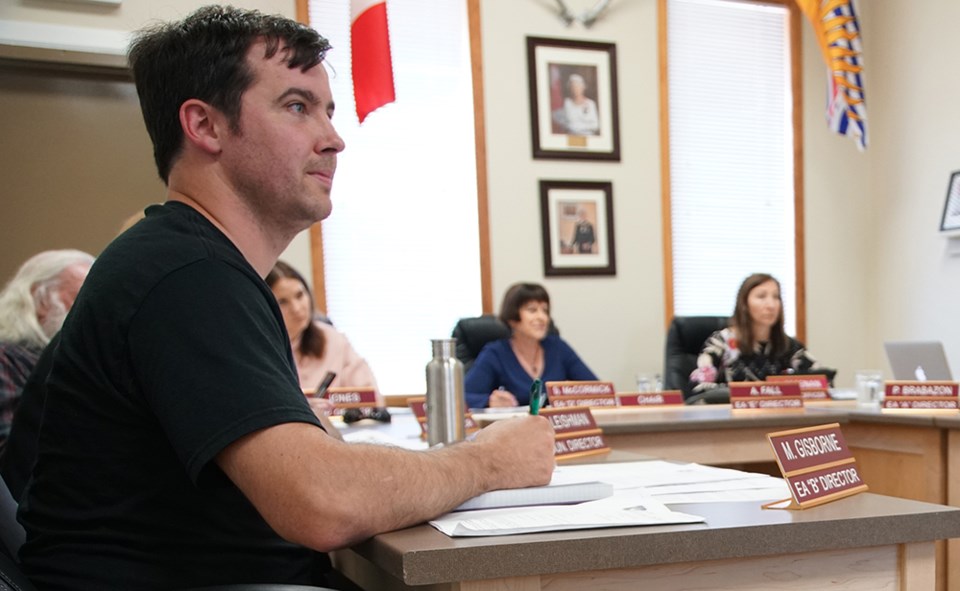A motion for a staff report outlining land use regulations policies failed at a qathet Regional District (qRD) planning committee meeting.
On April 12, Electoral Area B director Mark Gisborne moved: that the committee recommend the board direct staff to produce a report outlining the land use regulation policies relevant to the comments made by the chief administrative officer at the February 24 board meeting, and to include proposed policy revision options based on the feedback of the Let’s Talk Land Use engagement final report. The motion was seconded by Electoral Area A director Patrick Brabazon.
Gisborne said the regional district had the public engagement report that was tabled in March, where directors heard about regulations in the electoral areas. Gisborne said CAO Al Radke had made comments in February, and that he makes comments based on policy.
“The comments regarding the introduction and the implementation of new zoning bylaws was, and continues to be, a big item for discussion in our community; I believe we heard what the public’s wishes were,” said Gisborne. “I believe that the comment made was that the property owners directly impacted by the land use regulations were the ones whose votes really counted. My disagreement at that time was that the property owners who are liable to pay for those regulations are the ones whose votes really count.”
Gisborne said he attended the electoral areas directors’ forum recently and asked other directors about the matter. He said what he heard is that the generally accepted norm is those who pay for the services are the ones whose voices really count.
“Regardless of whether the zoning bylaw directly affects their property or not, I’m just wondering who in our community is really impacted,” said Gisborne. “Is it those who are having the zoning bylaw directly impact them or those who pay for it, and based on what we heard from the public, it should be up to the electoral area or general planning service.
“I’m just a little confused right now and hopefully with a staff report we can get some clarification and better serve our community.”
Area A director comments on motion
Electoral Area A director Patrick Brabazon said he, too, hoped that confusion around this could be eliminated. He said he wanted to start with the comments in the motion pertaining to the chief administrative officer.
“This motion asks for one staff member to comment on the comments of another staff member,” said Brabazon. “I think that is exceedingly inappropriate. We should not place any of our staff in a position of having to comment on another staff member. I will not be supporting this motion.”
Brabazon said Gisborne had spoken before about the greater community voting on particular zoning because the electoral areas pay for the planning service.
“However, he’s also mentioned that there was a referendum on Nootka Street,” said Brabazon. “I’ve reviewed the Nootka Street file from 1999. There was indeed a referendum. It was confined to the people who were affected by the zoning area. No one else voted and no one was asked to vote.”
Since then, Area B has acquired two more zones – Myrtle Pond and Traff Road, added Brabazon.
“Again, there was no referendum and there was no question of a referendum. To suggest, as director Gisborne just did, that the good people of Okeover in my area, or Gillies Bay in director McCormick’s area, are going to pass judgment on the neighbourhoods of Area C or Area B is again, frankly, grossly inappropriate,” said Brabazon “Let’s put this issue of referenda and who votes on zoning to bed. It’s the people directly affected in the zoning area. The rest of us can stand back and let the people in the neighbourhood decide.”
Gisborne said he was not referring to the greater regional district, just the electoral planning service area, and what occurred 23 years ago and what occurs today are different. He said a survey question asked of the public in the Let’s Talk Land Use process was whether they wanted more regulations in their area and the consultant said by area, they meant their electoral area.
“We heard back from the community and I think we need to respect them,” said Gisborne.
Gisborne’s motion failed, with Gisborne in favour and the three other electoral area directors opposed.




